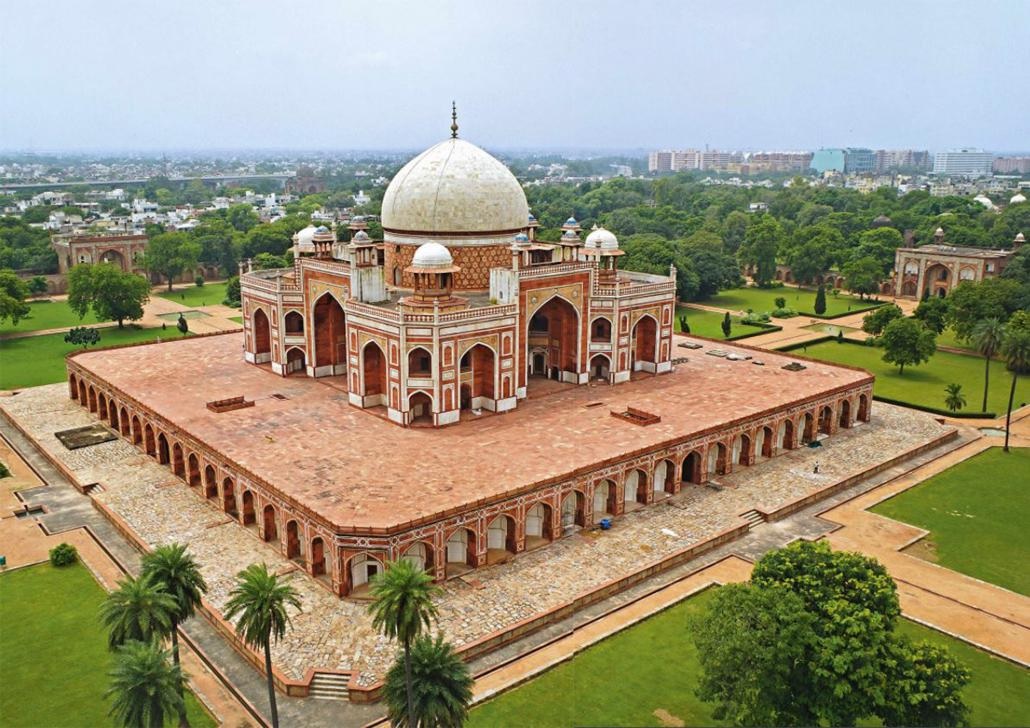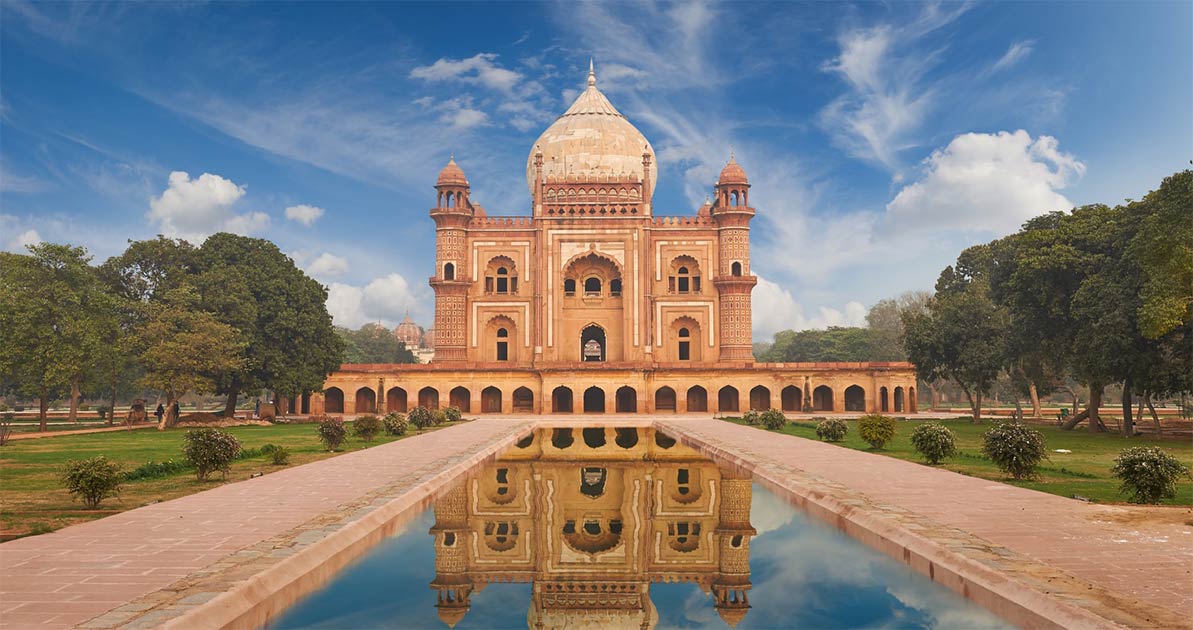
Tomba Di Humayun Delhi India Fotografie stock e altre immagini di
Humayun's Tomb, Delhi is the first of the grand dynastic mausoleums that were to become synonyms of Mughal architecture with the architectural style reaching its zenith 80 years later at the later Taj Mahal. Humayun's Tomb stands within a complex of 27.04 ha. that includes other contemporary, 16th century Mughal garden-tombs such as Nila.

Tomba di Humayun Tomba di Humayun La Tomba di Humayun (in … Flickr
Humāyūn's Tomb, commissioned by Ḥamīdah Bānū Begam in 1569 and designed by Mīrak Mīrzā Ghiyās̄, in Delhi, India. Humāyūn's Tomb, one of the earliest extant examples of the garden tomb characteristic of Mughal-era architecture, situated in Delhi, India. In 1993 it was declared a UNESCO World Heritage site.

HumayunTomb
Explore the expansive grounds, spot rare animals, and enjoy a fun-filled day amidst nature. Entry Fee: ₹40 for adults, ₹20 for children. Working Hours: 9:30 AM to 4:30 PM (Closed on Fridays). Crafts Museum: Delve into India's rich artistic traditions at the Crafts Museum, located a short distance from Humayun's Tomb.

Humayun's Tomb
English: Humayun's Tomb is a complex of buildings of Mughal architecture located in Nizamuddin east, New Delhi. It encompasses the main tomb of the Emperor Humayun as well as numerous others. The complex is a World Heritage Site and the first example of this type of Mughal architecture in India.

Tomba di Humayun Tomba di Humayun La Tomba di Humayun (in … Flickr
The small enclosure to the right of the entrance has a tomb and a mosque. Identified as Isa Khan's tomb, this monument was built at least 20 years before Humayun's tomb. The graves of Isa Khan and his family. The painted ceiling inside Isa Khan's tomb.

Humayun’s Tomb, Delhi, India Tourist Attraction (2023)
Humayun's Tomb, Delhi is a monumental Mughal garden-tomb complex. This dynastic mausoleum was built in 1570 for Humayun, the second Mughal Emperor of India, and now contains about 150 graves of ruling family members. It uses mainly red sandstone, with white and black marble inlays. It is a landmark in the development of Mughal architecture, as.

Humayun's Tomb in Delhi, India. The tomb was declared a UNESCO World
Humayun's tomb. This place is a UNESCO World Heritage Site, listed as Humayun's Tomb, Delhi. Humayun's Tomb from the entrance, Delhi. English: Humayun's tomb in Delhi, India. Built for Humayun, second Mughal Emperor of India, in 1562-71, now a UNESCO World Heritage site.

La Tomba Di Humayun. Delhi, India Immagine Stock Immagine di delhi
The work on Humayun's tomb had started in 1565 and was completed in 1572. The work on the tomb started 9 years after the death of Emperor Humayun. Humayun's Tomb Complex (courtesy: ankitsharma) The Tomb Complex. Located in the middle of a garden complex, Humayun's tomb is built on a raised platform of 7 m height.

Pathos of Humayun's tomb, arrest of last Mogul emperor and officer
Humayun's tomb. This tomb, built in 1570, is of particular cultural significance as it was the first garden-tomb on the Indian subcontinent. It inspired several major architectural innovations, culminating in the construction of the Taj Mahal. Cite this page as: UNESCO, "Humayun's tomb," in Smarthistory, June 3, 2021, accessed January 3.

Humayun Tomb Historical Facts and Pictures The History Hub
The first garden-tomb that was constructed in India was the spectacular Tomb of Humayun devoted to the second Mughal Emperor. So magnificent was the monument, that it came to inspire major architectural innovations throughout the Mughal Empire, including the world-renowned Taj Mahal in Agra, built about a century after Humayun's Tomb.

Tomba di Humayun Virtual Tour 360°
Located in the eastern part of Dehli, Humayun's tomb is one of the best preserved Mughal monuments. This spellbinding mausoleum is the first example of Mughal architecture in India. After a century from its construction Humayun's tomb inspired the construction of the more famous Taj Mahal.

LA TUMBA DE HUMAYUN... LA OLVIDADA PRECURSORA DEL TAJ MAHAL La Aldea
Humayun's tomb ( Maqbaera e Humayun) is the tomb of the Mughal Emperor Humayun in Delhi, India. The tomb was commissioned by Humayun's first wife and chief consort, Empress Bega Begum (also known as Haji Begum), in 1569-70, and designed by Mirak Mirza Ghiyas and his son, Sayyid Muhammad, Persian architects chosen by her.

La Tomba Di Humayun. Delhi, India Fotografia Stock Immagine di
Brief Synthesis Humayun's Tomb, Delhi is the first of the grand dynastic mausoleums that were to become synonyms of Mughal architecture with the architectural style reaching its zenith 80 years later at the later Taj Mahal.

Humayun's Tomb, the Mughal Mausoleum That Changed India’s Architecture
Humayun's Tomb is a fine example of a well-planned Mughal Charbagh. The Garden is divided into 4 parts, and each part is further divided into 8 sections. In the center, stands on a square platform, the majestic Humayun's Tomb. Though the structure appears to be a square from a distance, upon closer observation one realizes that the Tomb is.

The Tomb of Humayun, a photo from Delhi, North TrekEarth
Humayun's tomb ( Persian: Maqbara-i Humayun) is the tomb of Mughal emperor, Mirza Nasir al-Din Muhammad commonly known as Humayun situated in Delhi, India. [1]

29 Ottobre 2014 Vista Laterale Della Tomba Del ` S Di Humayun a Nuova
The Humayun's Tomb is a UNESCO World Heritage Site in Delhi Built for Mughal Emperor Humayun in the year 1570, itis the first grand dynastic garden mausoleum of the subcontinent. The tomb was constructed on the banks of the Yamuna river near the Nizamuddin Dargah. Spread across an area of 30 acres, it offers a panoramic view of the majestic.